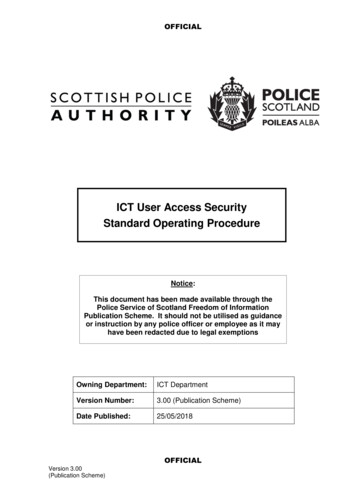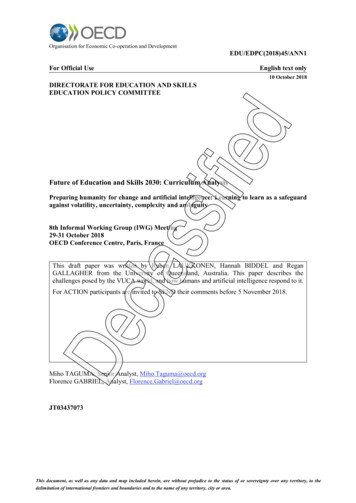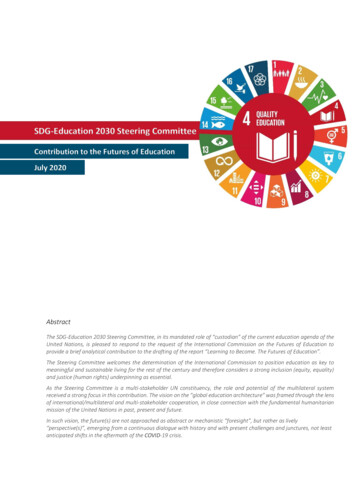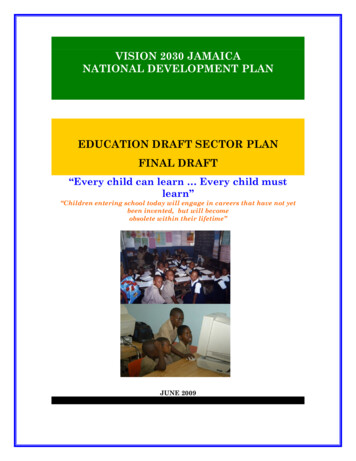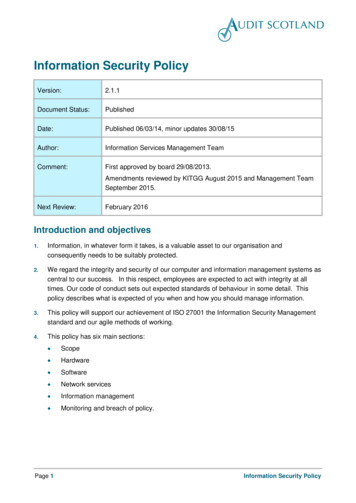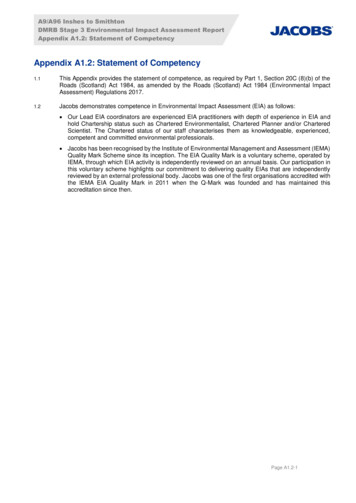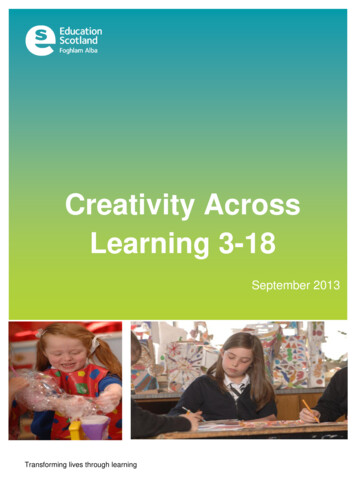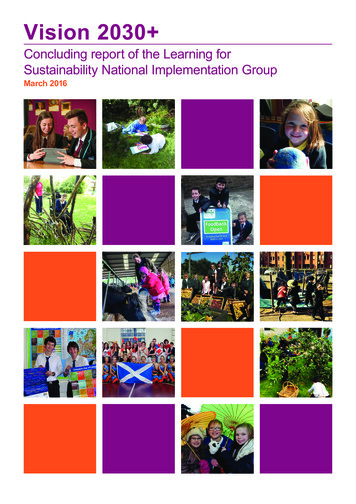
Transcription
Vision 2030 Concluding report of the Learning forSustainability National Implementation GroupMarch 2016
VISION 2030 CONCLUDING REPORT OF THE LEARNING FOR SUSTAINABILITY NATIONAL IMPLEMENTATION GROUPCONTENTS3EXECUTIVE SUMMARY12PROGRESS AND ACHIEVEMENTSOverview of progress since 201321VISION 2030 Reorienting learning to create a moresustainable future24MAKING THE VISION A REALITYRecommendations for 2016 onwards2828APPENDICESDetails of progress againstrecommendations40Membership of implementationand working groups41Glossary of acronyms“ By 2030 ensure all learners acquire knowledge and skills needed to promotesustainable development, incuding among others through education for sustainabledevelopment and sustainable lifestyles, human rights, gender equality, promotion ofa culture of peace and non-violence, global citizenship, and appreciation of culturaldiversity and of culture’s contribution to sustainable development.”UN Sustainable Development Goal 4.7Front cover photo credit: Alan Richardson02
VISION 2030 CONCLUDING REPORT OF THE LEARNING FOR SUSTAINABILITY NATIONAL IMPLEMENTATION GROUPEXECUTIVE SUMMARYIn March 2013 Scottish Ministers accepted all thirty-onerecommendations of the Learning for Sustainability (LfS) report1.The report recommended that every learner should receive theirentitlement to LfS and every practitioner should demonstrate LfS in theirpractice. In addition, it called for every school and centre to develop acoherent, whole school approach that impacts on their establishment’sculture, curriculum and campus and connects them fully to their widercommunities. The report introduced LfS as a concept and processwhich weaves together sustainable development education (SDE),global citizenship and outdoor learning into a unifying vision of learningfor a better world.The LfS National Implementation Group, whichwas established in February 2014 to deliver on therecommendations, is greatly encouraged by theprogress that has been made. Recognition is dueto local authorities, the LfS Working Group and alsothe many third sector organisations and networksthat have embraced the LfS report and agenda withenthusiasm and have given it life in so many ways.Above all we want to celebrate the passion,leadership and professional values and actions ofpractitioners and school leaders across Scotland.Their commitment to embedding LfS in thecurriculum is helping to nurture a generation ofchildren and young people who know and valuethe natural world. They are also committed tothe principles of social justice, human rights,global citizenship, democratic participation andliving within the ecological limits of our planet.This report is very much a celebration of thewonderful learning and teaching that is taking placein schools and early learning and childcare settingsacross Scotland as a result of that commitment.The tweets that permeate this report have beeninserted to give a flavour of the inspirational practicethat learners of all ages are experiencing on adaily basis in classrooms and outdoor settings.We are very fortunate in Scotland to have highlyqualified and motivated practitioners who reallycare about learners and who believe passionatelyin social justice, learner voice and valuesbased approaches to learning and teaching.1Learning for Sustainability Report, One Planet Schools Working Group (Dec curriculum/ACE/OnePlanetSchools03
VISION 2030 CONCLUDING REPORT OF THE LEARNING FOR SUSTAINABILITY NATIONAL IMPLEMENTATION GROUPIn Curriculum for Excellence, we have a flexibleand permissive framework for learning andteaching which gives teachers freedom to makelearning as engaging, meaningful, challenging,enjoyable and relevant as it can be. We trust in theprofessionalism of teachers to do the very best forlearners and many have realised the enormouspotential of LfS to help them achieve this.Some of those who have taken this approachreport a significant impact on learners: greaterconfidence; increased readiness and motivationto learn; increased attainment; progression insocial, critical thinking and communication skills.They also report that LfS significantly enhancesrelationships, the sense of community spirit,parental engagement and the reputation of theirestablishment. Staff too report that their learningand teaching has been reinvigorated and thatstaff wellbeing and attendance has improved –all as a result of adopting LfS approaches.At a national level, there have been manysuccesses and developments in the last two years.The following are worthy of special mention: theembedding of LfS in the General Teaching Councilfor Scotland (GTCS) Professional Standards; thepublication by Education Scotland of How Goodis Our School 4? which secures LfS within theframework for self-evaluation and self-improvement;and the passing of the Children and YoungPeople’s Act (Scotland) 2014 which enshrines inthe education system enhanced duties in relationto the United Nations Convention on the Rightsof the Child (UNCRC). These developments willensure that LfS will be rooted in the very fabric ofschool education and will undoubtedly help to bringabout transformational change at system level.In addition, the partnership working between thedifferent agencies, third sector organisations andnetworks connected to the various aspects of theLfS agenda has been hugely encouraging. Thespirit of collaboration, openness and commonvalues amongst these bodies has clearly beenfurther enhanced by the concept of LfS as outlinedin the LfS Report. The combined expertise, reachand capacity of these organisation and networks,aligned to the vision of LfS, will be a powerfulvehicle for change as we enter the next phase.Dr Alasdair Allan MSP, Minister for Learning, Science and Scotland’sLanguagesAnd at the same time as Scotland was identifyingand implementing LfS goals at a national level aparallel process was taking place globally. TheUnited Nations Sustainable Development Goals(SDGs), launched in New York in September2015, set out a seventeen-point global action planto end poverty, combat climate change and fightinjustice and inequality. Unlike their predecessor,the Millennium Development Goals, which weretargeted towards developing nations, the SDGsare for every nation. Scotland’s First Minister,Nicola Sturgeon, ensured that Scotland wasthe first country in the world to sign up to these2015-2030 goals. In particular, Education Goal4.7 will provide crucial forward momentum forthe LfS agenda in Scotland, building on all thathas been achieved over the course of the UnitedNations Decade of Education for SustainableDevelopment which concluded in December 2014.04
VISION 2030 CONCLUDING REPORT OF THE LEARNING FOR SUSTAINABILITY NATIONAL IMPLEMENTATION GROUPThe LfS Implementation Group is notcomplacent, however, and we are mindfulof our duty to advise Scottish Ministers ofthe work that remains to be done and thechallenges that lie ahead. These include:The further recommendations are as follows: Stakeholders are encouraged to note the Promoting awareness of LfS as a conceptand process so it is universally understood Taking LfS forward at a time of financial constraintwith growing pressures on staff at school leveland system leaders at local and national level Embedding LfS in professional review anddevelopment (PRD) processes at school levelor through self-evaluation, to ensure it is nottreated superficially but rather that it bringsabout more profound and deeper change Ensuring that LfS is not crowded out ofschool, local and national improvement plansdue to other priorities and initiatives.To address these challenges, and to signal thedirection we need to take to ensure continuedprogress, we have set out a vision for LfS throughto 2030 and beyond. This is to ensure we do notlose sight of what is at stake, and to serve as areminder of the importance of LfS to our childrenand young people and our collective future.First and foremost we invite all practitioners, schoolleaders and system leaders to continue to make themost of the opportunities that already exist. Scotlandhas one of the most progressive approaches to LfSin the world, and this is supported at many levels.We hope this provides a sense of freedom and thatpractitioners and school leaders feel energisedto extend and deepen their practice. Many arealso recognising that LfS, as an engaging andenabling approach, is helping them progress manyother aspects of learning. This includes sciences,technologies, engineering and mathematics(STEM), interdisciplinary learning, and raisingattainment in literacy and numeracy among others.In our advisory role to Scottish Government wehave identified a number of recommendations forMinisters and education bodies to ensure that thework of the LfS National Implementation Groupprovides an effective platform for further actionthrough to the realisation of the SDGs by 2030.2Improving Schools in Scotland: An OECD Perspective, OECD ools-in-scotland.htm central role of education running throughout allthe SDGs. Securing the entitlement of everylearner to LfS within Curriculum for Excellenceneeds to be seen as the means through whichwe realise SDG Goal 4.7 and contribute to theeducational aspects within the other goalsScottish Government, Education Scotland,General Teaching Council for Scotland, ScottishQualifications Authority (SQA), ScottishCollege for Educational Leadership (SCEL)and other key agencies and bodies shouldcontinue to include LfS in their corporate plans,strategies, processes and communicationsto promote on-going engagement, reflectionand advancement of LfS at all levelsRelevant stakeholders should continueto explore opportunities to develop LfSprofessional learning opportunities whichare readily available to practitioners,including online learning programmes andappropriate Masters-level provisionFurther consideration needs to be givento the role of LfS in the delivery of theScottish Attainment Challenge, the NationalImprovement Framework, Developing theYoung Workforce Programme and the on-goingdevelopment of Curriculum for Excellence,following the OECD Review2 of CfETeacher education institutions (TEIs), the GTCS,SCEL and other institutions who support theleadership agenda need to continue to buildthe capacity of practitioners and school leadersin line with the Professional StandardsA partnership approach to sustainable schoolbuildings and grounds involving ScottishGovernment, Education Scotland and otherkey stakeholders is necessary to ensurecoordination on the delivery of LfS at a nationallevel. Local authorities need to remain vigilantin ensuring that improvements to their schoolestate meet the highest standards of sustainableand environmental design as set out in BuildingBetter Schools and Principle Six of the SchoolEstate Strategy. Buildings and grounds need tosupport learning for sustainability pedagogy andpractice and include the provision of thoughtfullydeveloped greenspace to support learning andfacilitate daily contact with nature and natural play.05
VISION 2030 CONCLUDING REPORT OF THE LEARNING FOR SUSTAINABILITY NATIONAL IMPLEMENTATION GROUPWe would like to impress upon all those involved ineducation the importance of continuing to supportthis work and taking forward these actions. We mustguard against a box-ticked, short-term approachwhich could see important gains and opportunitiesbeing squandered. The scale of the undertaking,to address the SDGs and particularly to ‘learn ourway’ towards a sustainable future, is considerableand requires long-term, sustained commitment.Scotland’s progress and achievements in relationto LfS are increasingly being recognised on aninternational stage. We must continue to supportand resource LfS first and foremost because ofthe positive impact it has on our children andyoung people, but also because Scotland has theopportunity to be at the vanguard of global change.By striving for all our learners to receive theirentitlement to learning for sustainability this smallnation can lead the charge to a better world for all.The strategic recommendations from theLearning for Sustainability Report (2012)1. All learners should have an entitlementto learning for sustainability2. In line with the new GTCS ProfessionalStandards, every practitioner, school andeducation leader should demonstratelearning for sustainability in their practice3. Every school should have a whole schoolapproach to learning for sustainability thatis robust, demonstrable, evaluated andsupported by leadership at all levels4. All school buildings, grounds and policiesshould support learning for sustainability5. A strategic national approach tosupporting learning for sustainabilityshould be establishedProfessor Peter HigginsDavid LengCo-chairs of the Learning for SustainabilityNational Implementation Group“ The UN’s Sustainable Development Goals offer a vision of the world that I believepeople in Scotland share . I am delighted to confirm that Scotland has become one ofthe first nations on Earth to publically sign up to these goals and provide internationalleadership on reducing inequality across the globe We need to grasp the opportunitythat following this path offers to create a fairer Scotland and a better world both now andfor generations to come.”Nicola Sturgeon,First Minister of Scotland (July 2015)06
VISION 2030 CONCLUDING REPORT OF THE LEARNING FOR SUSTAINABILITY NATIONAL IMPLEMENTATION GROUPLearning for sustainability (LfS) is an approach to life and learning which enables learners,educators, schools and their wider communities to build a socially-just, sustainable andequitable society. An effective whole school and community approach to LfS weavestogether global citizenship, sustainable development education, outdoor learning andchildren’s rights to create coherent, rewarding and transformative learning experiences.How Good is Our School 4? Education Scotland, 201507
VISION 2030 CONCLUDING REPORT OF THE LEARNING FOR SUSTAINABILITY NATIONAL IMPLEMENTATION GROUPThen (2013)Now (2016)Future (2020-25)Emerging awareness and understandingof LfS as a unifying concept and itsrelevance to Curriculum for Excellence.Increased understanding of LfSthrough professional learning,events, publications, communicationchannels and online support.All practitioners have understandingof the role of LfS within CfEand have a deep personalcommitment to LfS principles.No reference to LfS in GTCS standards.LfS embedded throughout revisedGTCS professional standards with somepractitioners beginning to engage andreflect on their practice and learningneeds through the PRD process.All practitioners demonstrate LfSin their practice and emulate theprofessional values and actions asoutlined in the Professional Standards.Some references to global citizenshipand outdoor learning in How Good Is OurSchool 3? self-evaluation frameworkLfS features in a number of QualityIndicators within How Good Is OurSchool 4? with schools beginningto consider the implications fortheir own self-evaluationAll establishments demonstratingcoherent and robust whole schooland community approaches to LfSas a result of on-going process ofself-evaluation based on HGIOS4?93 practitioners sought professionalrecognition in LfS through the GTCSMore than three times as manypractitioners applied for LfSprofessional recognition in 2013/14,with a total of 292 applications.Every establishment or setting to have atleast one practitioner with accreditation inLfS with a significant proportion of thesehaving accreditation at Masters level.Organisations (from all sectors includingthe third sector) offering specificprofessional learning and resources tosupport outdoor learning, SDE, globalcitizenship and children’s rights.A more coordinated approach isevident with an increasing number oflocal and national providers aligningprogrammes to an LfS approach.LfS approaches are embedded inall relevant professional learningprogrammes which also align to theScottish Attainment Challenge andNational Improvement Framework.Examples of strategic authority-wideapproaches to global citizenship,sustainable development education andoutdoor learning exist but few examplesof strategic approaches at authoritylevel which weave these together.Improved inter-authority networking,strategic planning and collaborationthrough LfS practitioner andpartner networks. LfS beginningto feature in school improvementplans and (in some cases) in wholeauthority improvement plans.All authorities have adopted coherentand strategic approaches to LfS tothe point that it has become fullyembedded in their practice.The above table summarises some of the successes to date and projects expectations of future progress. It will benecessary to take stock of these projected aims at agreed intervals as new priorities emerge and targets are overtaken.“ Leadership within and across the education system is essential to sustain efforts andensure ESD objectives are adopted and moved into action. At a subnational level,Scotland and Manitoba stand out as examples where high-level political leadership,coordination with stakeholders and accountability helped these jurisdictions to set thevision and goals for the promotion and adoption of ESD in educational policies andplans.”Shaping the Future We WantThe UN Decade of Education for Sustainable Development (2005-14)Final Report UNESCO (2014)08
VISION 2030 CONCLUDING REPORT OF THE LEARNING FOR SUSTAINABILITY NATIONAL IMPLEMENTATION GROUPLEARNING FOR SUSTAINABILITY AT THEHEART OF GOVERNMENT POLICYLand use andland ustainableTransportSchoolBuildings andGroundsHealth andWellbeingLow carbonskills and jobsNationalImprovementFrameworkCurriculum omyLearning forSustainabilityClimateChange ActZero Waste PlanRenewableEnergyChildrenand YoungPeople ActFood mentMarine wnregenerationChild povertystrategyCrofting ActUNCRC/Gettingit right forevery child(GIRFEC)Note: the list of LfSrelated policy areasincluded in the diagramis by no meansexhaustive.Farming,Forestry,Fisheries, Food& DrinkCommunityLearning andDevelopmentBetter Eating,Better LearningLearning forsustainability (LfS)offers opportunitiesto deliver meaningfullyon the educationalaspects of manydifferent policyareas. A centrally coordinated approachto implementation,using LfS as a focuswhere relevant andappropriate, willprevent a piecemeal,‘policy by policy’response.Fairer ScotlandConsultation09
VISION 2030 CONCLUDING REPORT OF THE LEARNING FOR SUSTAINABILITY NATIONAL IMPLEMENTATION GROUPSCOTLANDLeading the world to a more sustainable futureScotland is a renowned nation of innovation, science and great thinkers. We take pride in listing the manyScottish discoveries and inventions such as the television, telephone, pneumatic tyres and even theoverdraft! Less well-known perhaps is Scotland’s contribution to the creation of a more sustainable world.1827 – Scottish essayist and writer Thomas Carlyle introduces the word ‘environment’ tothe world.1890 – The conservation work of Scottish-born John Muir in Yosemite in California leads him tobe known as the ‘Father of National Parks’.1915 – Prominent Scottish thinker, town planner and environmentalist, Patrick Geddes,introduces the concepts of ‘environmental sustainability’ and ‘thinking global, acting local’.1992 – Professor John Smyth co-writes the education chapter of the United NationsRio Declaration on Environment and Development (Rio Earth Summit).1999 – Opening of new Scottish Parliament. Emergence of a policy agenda building on thework of many of the great thinkers above leading to Land Reform and Naional Parks Acts, etc.2005 – The Governments of Scotland and Malawi sign a Cooperation Agreement, leading to adecade of reciprocal exchange and partnership working on education, health, agriculture andrenewable energy.2009 – Climate Change (Scotland) Act 2009 becomes the most ambitious legislation of its kindin the world setting targets to reduce greenhouse gas emissions by 42% by 2020 and 80% by2050.2013 – Scotland becomes the first nation to join the Circular Economy 100 Group. It alsobecomes one of the world’s first Fair Trade Nations – second only to Wales.2014 – Scotland becomes the first nation to embed the United Nations Convention on theRights of the Child and learning for sustainability in its professional standards for educationpractitioners. Voting is extended to sixteen year-olds to allow them to participate in theReferendum on Scottish Independence.2015 – Scotland is the first nation to commit to the United Nations Sustainable DevelopmentGoals.2016 – The Foundation for Environmental Education recognises the success of theEco-Schools Scotland programme by awarding Scotland the status of the best country in theworld for sustainable development education and environmental education.10
VISION 2030 CONCLUDING REPORT OF THE LEARNING FOR SUSTAINABILITY NATIONAL IMPLEMENTATION GROUPRAISING ATTAINMENT ANDACHIEVEMENT THROUGH LFSWhat the research tells us“ Teachers comprehensively reported that taking provisions outdoors increased ‘pupil engagement’in learning in the vast majority of events. Compared to indoor settings, outdoor lessons resulted inthe significant enhancement of (in order of incidence): ‘challenge and enjoyment’, ‘personalisation’,‘relevance’, ‘breadth’, and ‘progression’. Outdoor events in green and natural places of various kinds(parks, gardens, wildlife areas, woods/forests) and residential experiences (where experiences ofnatural areas would be common) had the highest rates of enhancement of ‘challenge and enjoyment’.”Teaching, learning, and play in the outdoors:a survey of school and pre-school provision in ScotlandScottish Natural Heritage (2015)3“ Teachers felt that the natural play space has contributed to increased punctuality when returning toclass after play, improvement in the time needed to settle back into class, improvement in mood afterplay, increased concentration and attainment levels after play, increase in the quality of social interactionwith other pupils and teachers, and a decrease in incidents of difficult behaviour.”Natural Play: Making a difference to children’s learning and wellbeingForestry Commission Scotland (2011)4“ From young people’s perspectives, rights-based experiences and a good education cannot be easilyseparated; they were intimately connected in the lives of the young people. We conclude, therefore,that it is less useful to see a rights-based education as an add-on to mainstream education; it is betterunderstood as a way of working across all school life.”How Young People’s Participation in School SupportsAchievement and Attainment (2015) 5“ Overarching findings showed that education is more effective when global and local sustainabilityissues are integrated throughout the curriculum. Results also show that when curricula is delivered inlocal social, economic, and environmental contexts, traditional learning outcomes are maintained oreven heightened while additional, enhanced, and transformational learning occurs to both primary andsecondary students. All of these attributes coincide with higher order skill levels in the PISA tests. Thus,ESD and PISA are synergistic in many ways.”The Contributions of Education for Sustainable Development (ESD) To Quality Education:A Synthesis of an International Research Project (UNESCO, 2015)63 Mannion, G., Mattu, L. & Wilson, M. 2015. Teaching, learning, and play in the outdoors: a survey of schooland pre-school provision in Scotland. Scottish Natural Heritage Commissioned Report No. 779.4 Groves, L. & McNish H, (2011) Natural Play: Making a difference to children’s learning and wellbeing, A longitudinalstudy of the Forestry Commission – Merrylee Primary School – Glasgow City Council partnership 2008 – 20115 Mannion,G. Sowerby M. & I’Anson, J (2015) How Young People’s Participation in School Supports Achievementand Attainment, SCCYP/ University of Stirling6 Laurie, R., Nonoyama-Tarumi, Y., McKeown, R. & Hopkins, C. (2016). Contributions of Education for SustainableDevelopment (ESD) to Quality Education: A synthesis of research (UNESCO)11
VISION 2030 CONCLUDING REPORT OF THE LEARNING FOR SUSTAINABILITY NATIONAL IMPLEMENTATION GROUPPROGRESS AND ACHIEVEMENTSOverview of progress since 2013The LfS Report recognised that “much expertiseand good practice already exists” and that manyestablishments in Scotland are successfullyworking towards a coherent whole school andcommunity approach. The challenge for theImplementation group has been to ensure that alllearners receive their entitlement to LfS within theframework of Curriculum for Excellence, not justin those classrooms where teachers happen to bepassionate enthusiasts. This has necessitated anagenda for strategic change in Scottish education toremove systemic barriers and to ensure that LfS iseffectively hard-wired into key policies and drivers.As we look back over the time since theLfS Report was published in December2012 there are a number of highlights whichdemonstrate that progress has been made:Learning – Our view is that learners acrossScotland are receiving their entitlement to learningfor sustainability in ever-increasing numbers.Practitioners are making this happen because theycare about learners and their futures and becauseof their own desires for a better world and future.Above all, they want to engage learners by ensuringtheir learning is relevant to their lives and interests.to achieve a whole school and communityapproach. They also recognise that the collectiveimpact of these approaches will be greater thanthat of the individual components delivered inisolation. It is this integrated approach that helpslearners understand the nature of complex realworld issues and to value and develop the skillsneeded to address them throughout their lives.Their international education, learner voice andchildren’s rights programmes as well as theircommunity partnership working will form animportant part of this convergence too. Manyestablishments have reached this goal alreadyand many others are working successfully towardsit. They are supported in this by their authoritiesand a rich network of support and partnerorganisations that are increasingly aligning theirprogrammes to the vision and principles of LfS.Many may not be using the term LfS as yet, butthey will recognise terms in the LfS word cloud(on page 7) within their practice and their learningexperiences. Many schools are recognising toothat they have all the essential ingredients of LfSin place: all that remains is for them to identifythe golden thread that weaves together theirachievements in global citizenship, sustainabledevelopment education and outdoor learning12
VISION 2030 CONCLUDING REPORT OF THE LEARNING FOR SUSTAINABILITY NATIONAL IMPLEMENTATION GROUPWork in progress – Through on-going collectiveaction, professional learning, networking andmentoring, we should continue to ensure allestablishments have the support they need toenable them to continue in their journey to awhole school and community approach. Weneed to improve 3-18 progression in learningacross clusters and between sectors and ensurelearners in the senior phase also receive theirentitlement. We need to focus too on learners indeprived areas to make sure they benefit fromhigh-quality learning in LfS including throughoutdoor learning and engaging ‘learner voice andparticipation’. We need to ensure that schools areencouraged and supported to link their work inLfS to their work on attainment, improvement anddeveloping the young workforce. We need to ensurethat the inspiring and transformational learningcurrently enjoyed by many learners in relationto LfS is experienced by every learner througha progressive, coherent approach to delivery.Whole School here is your establishment on its journey to a whole school and community approach?CommunityAs an establishment progresses towards a whole school approach, connections are increasinglymade between activities and programmes until they are formed into a unified and coherent approachto LfS that impacts on the curriculum, campus, community and culture of the establishment.13
VISION 2030 CONCLUDING REPORT OF THE LEARNING FOR SUSTAINABILITY NATIONAL IMPLEMENTATION GROUPGTCS Professional Standards – The launch ofthe revised GTCS Professional Standards has beena defining achievement. LfS is fully embedded inthe Standards at all levels (Registration, Careerlong Professional Development and Leadershipand Management) and is articulated in both theprofessional values and actions. Scotland is theonly country in the world to have incorporated LfSand referenced the United Nations Conventionon the Rights of the Child in its professionalstandards. This has wide-reaching implicationsfor the professional review and developmentprocesses, and Professional Update, for all 74,000registered education professionals in Scotland.Practitioners will now have the opportunity toreflect on their practice and development needsin relation to LfS on an on-going basis andshould have the opportunity to access highquality professional learning to support furtherimprovement in their practice, confidence and skills.Work in progress – There is still work to doto promote understanding of LfS amongstpractitioners and school leaders. Practice inrelation to the Professional Standards andProfessional Update is still emerging and it isimportant to guard against a superficial approachto LfS. By ensuring that adequate support isavailable to school leaders, line managers andpractitioners, LfS discussions and reflection canbecome an
2015-2030 goals. In particular, Education Goal 4.7 will provide crucial forward momentum for the LfS agenda in Scotland, building on all that has been achieved over the course of the United Nations Decade of Education for
